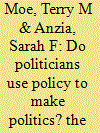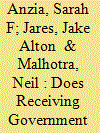|
|
|
Sort Order |
|
|
|
Items / Page
|
|
|
|
|
|
|
| Srl | Item |
| 1 |
ID:
149678


|
|
|
|
|
| Summary/Abstract |
Schattschneider's insight that “policies make politics” has played an influential role in the modern study of political institutions and public policy. Yet if policies do indeed make politics, rational politicians have opportunities to use policies to structure future politics to their own advantage—and this strategic dimension has gone almost entirely unexplored. Do politicians actually use policies to make politics? Under what conditions? In this article, we develop a theoretical argument about what can be expected from strategic politicians, and we carry out an empirical analysis on a policy development that is particularly instructive: the adoption of public-sector collective bargaining laws by the states during the 1960s, 1970s, and early 1980s—laws that fueled the rise of public-sector unions, and “made politics” to the advantage of Democrats over Republicans.
|
|
|
|
|
|
|
|
|
|
|
|
|
|
|
|
| 2 |
ID:
187669


|
|
|
|
|
| Summary/Abstract |
When individuals receive benefits from government programs, does it affect their attitudes toward those programs or toward government generally? A growing literature blends policy feedback theory and political behavior research to explore these questions, but so far it has focused almost exclusively on social policies such as the Affordable Care Act. In this article, we focus on a very different set of government programs that reach a more conservative, rural population: agricultural assistance. Our study ties administrative records on participation in USDA farm aid programs to an original, first-of-its-kind survey measuring agricultural producers’ political attitudes. We find that receiving agricultural assistance is sometimes related to producers’ views of the program delivering the benefits, but it depends on the divisiveness of the program and—for highly partisan programs—recipients’ ideology. However, receiving federal agricultural assistance is not associated with more positive views of government.
|
|
|
|
|
|
|
|
|
|
|
|
|
|
|
|
| 3 |
ID:
170304


|
|
|
|
|
| Summary/Abstract |
New scholarship in American politics argues that interest groups should be brought back to the center of the field. We attempt to further that agenda by exploring an aspect of group influence that has been little studied: the role interest groups play on the inside of government as official participants in bureaucratic decision-making. The challenges for research are formidable, but a fuller understanding of group influence in American politics requires that they be taken on. Here we carry out an exploratory analysis that focuses on the bureaucratic boards that govern public pensions. These are governance structures of enormous financial consequence for state governments, public workers, and taxpayers. They also make decisions that are quantitative (and comparable) in nature, and they usually grant official policymaking authority to a key interest group: public employees and their unions. Our analysis suggests that these “interest groups on the inside” do have influence—in ways that weaken effective government. Going forward, scholars should devote greater attention to how insider roles vary across agencies and groups, how groups exercise influence in these ways, how different governance structures shape their policy effects, and what it all means for our understanding of interest groups in American politics.
|
|
|
|
|
|
|
|
|
|
|
|
|
|
|
|
|
|
|
|
|